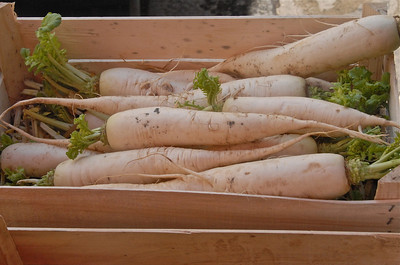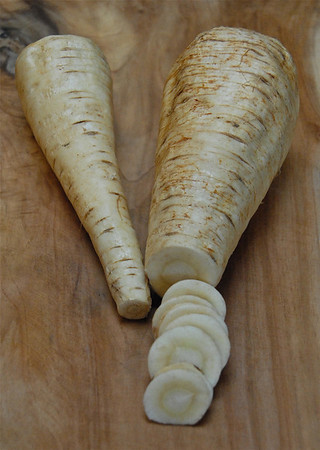
The downside to be married to, or even knowing, a writer is that inevitably you get pulled into one of her stories. Three years ago that very thing happened to my husband. Not only did I mention him in an article about root vegetables but also did an editor make him the star of the headline: At 38 man finally tries parsnips.
The good news is that he now likes this pale, oblong vegetable. That is good news, indeed. High in starch and fiber as well as potassium, this relative of the carrot has long provided nourishing, filling meals.
Although it took my husband almost four decades to appreciate this frost-hardy plant, much of the Western world has consumed it since ancient times. Growing wild throughout Europe and western Asia, the parsnip was first farmed during Roman times. Because it prospers in cooler climates and sandy or impoverished soils, it is ideal peasant food.
Parsnips served a vital role in medieval European cuisine. At a time when sugar was a rare luxury, these honeyed veggies acted as the sweetener in pies, pastries and even fermented drinks. In Northern Ireland they formed the basis for beer, while the rest of Great Britain used them in wine.

With the arrival of sugar, parsnips gradually fell out of favor. The introduction of potatoes likewise reduced their popularity. I find this a shame for these sweet vegetables have much to offer.
Easy to prepare, parsnips can be baked, stewed, steamed or pureed alone or with other root vegetables. Often they are boiled and mashed with butter, just like their usurper, the potato. I prefer to cut them into chunks and bake them with fresh rosemary, a sprinkle of salt and olive oil, or turn them into a creamy, rich soup.
I’ve also been known to turn them into hearty and healthful parsnip chips. Just slice the parsnips and toss them with olive oil and salt. Spread them across a cookie sheet and bake them in a 375 degree Fahrenheit oven until slightly caramelized, about 10 to 15 minutes. Without question, parsnip chips are my ultimate salty-sweet snack.
Parsnips reach their prime after the first frost. Considering the East Coast snow of last weekend, they should now be perfect for picking and eating.
PARSNIP AND FENNEL SOUP
Serves 4 to 6
1 pound of parsnips, peeled and diced
About 1 pound of fennel bulb, diced (save tops for garnish if you want); adjust accordingly, as not everyone enjoys the taste of fennel
1 medium onion, chopped
4-6 tablespoons unsalted butter
1/4 cup all-purpose flour
5 cups chicken or vegetable broth
1 cup heavy cream
1/8-1/4 teaspoon salt
1/4 teaspoon freshly ground black pepper
Generous handful of hazelnuts, toasted and coarsely chopped
In a Dutch oven, cook the parsnips, fennel and onion in butter over moderately low heat, stirring periodically for about 15 minutes, or until soft
Add the flour, stirring 3 or so minutes
Add the stock and bring to a boil. Reduce the heat and simmer for about 20 minutes
Add the cream, salt and pepper. Stir until heated through. Top with chopped fennel tops and hazelnuts and serve.